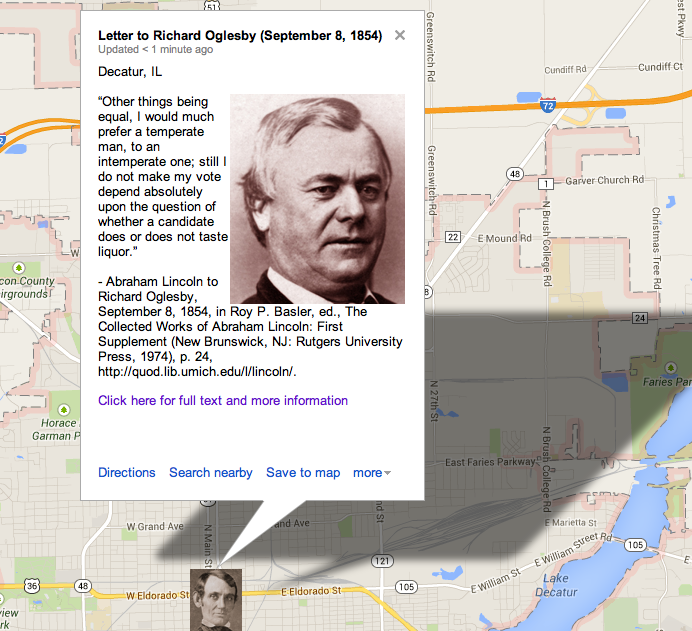Contributing Editors for this page include Chris Jaax
Ranking
#137 on the list of 150 Most Teachable Lincoln Documents
Annotated Transcript
On This Date
HD Daily Report, September 8, 1854
The Lincoln Log, September 8, 1854
Custom Map
Close Readings
Posted at YouTube by “Understanding Lincoln” course participant Chris Jaax, August 2014
How Historians Interpret
“When he heard that Democrats were whispering that Yates, though professing to be a temperate man, was a secret drinker, he recognized that the rumor might cost the Whigs the large prohibitionist vote and sought to kill the allegation. ‘I have never seen him drink liquor, nor act, or speak, as if he had been drinking, nor smelled it on his breath,’ he wrote. But then – almost as if he realized that the future would show that Yates did indulge in liquor, to the point of being intoxicated when he was inaugurated as governor of Illinois in 1861 – Lincoln carefully explained his own position to a friend: ‘Other things being equal I would much prefer a temperate man, to an intemperate one; still I do not make my vote depend absolutely upon the question of whether a candidates does or does not taste liquor.’”
–David Herbert Donald, Lincoln (New York: Simon & Schuster, 1995), 171.
“Lincoln helped Yates plot campaign strategy. To counter rumors that the congressman was a nativist bigot, Lincoln drafted a letter for him to circulate. (Yates ignored the advice and later acknowledged that his failure to heed Lincoln probably cost him the election.) Antiforeign, anti-Catholic sentiment was sweeping the North, in some states becoming the dominant theme in 1854. Supporters of this movement, called Native Americans or Know Nothings, adopted the slogan, “Americans must rule America.” They believed that Catholicism was incompatible with America’s democratic, individualistic values; that Catholics had disproportionate power; that established political parties and professional politicians were corrupt and unresponsive to the popular will; that slavery and liquor were evil; and that immigrants were the source of crime, corruption, pauperism, wage reductions, voter fraud, and the defeat of antislavery candidates.”
–Michael Burlingame, Abraham Lincoln: A Life (2 volumes, originally published by Johns Hopkins University Press, 2008) Unedited Manuscript by Chapter, Lincoln Studies Center, Volume 1, Chapter 10 (PDF), 1087.
NOTE TO READERS
This page is under construction and will be developed further by students in the new “Understanding Lincoln” online course sponsored by the House Divided Project at Dickinson College and the Gilder Lehrman Institute of American History. To find out more about the course and to see some of our videotaped class sessions, including virtual field trips to Ford’s Theatre and Gettysburg, please visit our Livestream page at http://new.livestream.com/gilderlehrman/lincoln

